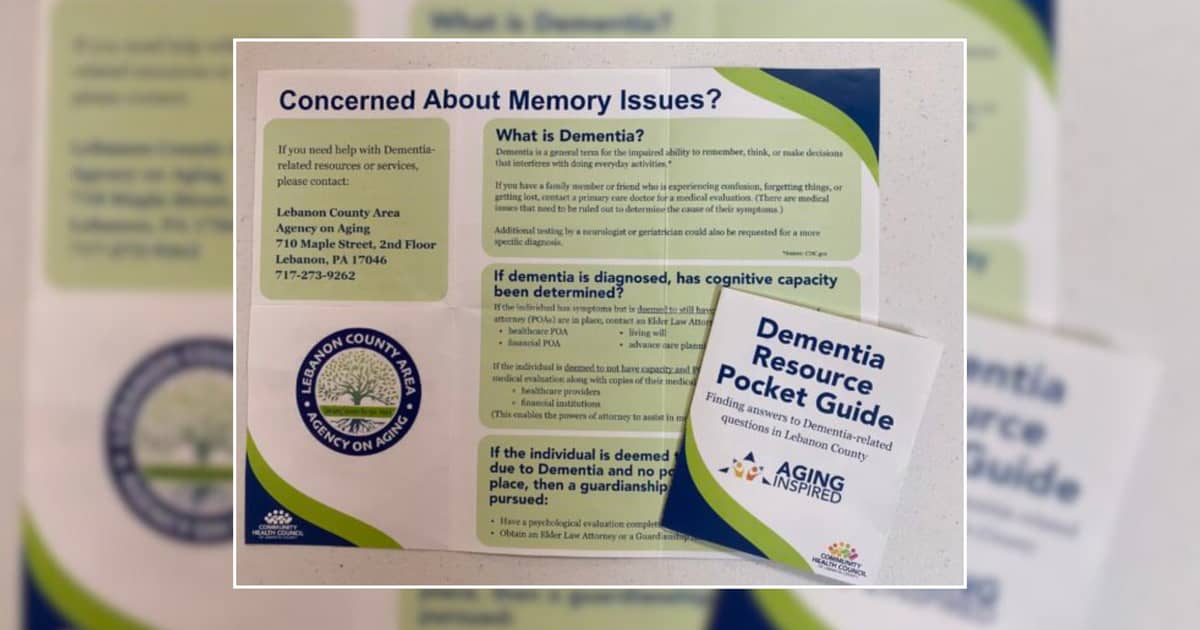Your 84-year-old aunt calls you five times in 30 minutes to invite you for coffee.
When you get to her house, she can’t find the coffee — you discover it and her house keys in the dishwasher — and the cream has soured. She’s called the police, she tells you, because her neighbor — a retired firefighter — has been bothering her.
Are your aunt’s behaviors a normal part of aging, or is something else going on?
A new resource — The Dementia Resource Pocket Guide: Finding answers to Dementia-related questions in Lebanon County — can help family members, friends, and neighbors understand whether a loved one’s forgetfulness, confusion, and agitation could be dementia or a different health condition.
The guide is available at some medical offices, pharmacies, Penn State Extension, and the office and website of the Lebanon County Area Agency on Aging.
“The prevalence of dementia and Alzheimer’s has been increasing exponentially over decades, and people don’t really know where to go for help,” said Lori Klein, an Extension Educator with Penn State’s Lebanon office and co-chair of the county’s Dementia Task Force that created the pocket guide.
“We want to direct people to where they can find reliable information, resources, and support,” Klein added.
Dementia is an umbrella term used to describe a variety of diseases — such as Alzheimer’s, vascular dementia, and lewy body dementia — that affect a person’s memory and thinking ability and if severe, can interfere with daily life. Because there are medical conditions that can present with symptoms similar to dementia, a medical assessment by a healthcare provider is needed to determine the exact cause of the cognitive decline, Klein said.
Finding answers to whether changes in a loved one’s behavior are a natural part of aging or a red flag for dementia can be overwhelming.
The pocket guide provides a starting point for people to figure out what to do, where to go for help, and what to consider, said Adrian Layser, administrator with the Area Agency on Aging and co-chair of the Dementia Task Force.
For instance, it gives 10 warning signs of Alzheimer’s and dementia such as “confusion with time or place” and “difficulty completing familiar tasks.” It also includes steps on how to access dementia-related services in Lebanon County, who to contact to learn about support groups, and where to turn to set up a power of attorney if the loved one no longer has decisional capacity.
In-depth information on each of those, including an expanded list of resources, is available from the county Area Agency on Aging.
That office also can help with a preliminary screening for cognitive decline. Agency staff can administer a tool — St. Louis University Mental Status exam — that measures cognitive impairment and decline, Layser said.
“Given that we already provide programs and services to older adults, it makes sense for this office to coordinate information on dementia, dementia-related community support groups, and options for care in the present and future,” she added. “We also can refer and coordinate with outside entities including nursing homes, personal care homes, and personal care agencies.”
The pocket guide also identifies different services available in the county, one of which is legal services that can help families set up healthcare power of attorney (POA), financial POA, living wills, and advance care planning (ACP) documents.
Completing these while still having cognitive capacity allows people to have a voice in their future medical care, living arrangements, and choosing care support and partners. Without those documents, family members do not have legal authority to make decisions for their loved ones if they no longer have decisional capacity.
“It’s critically important to have conversations with family members about the quality of life they want as they age and lose their capacities,” said Kathleen Hetrick, member of the Dementia Task Force and the Advance Care Planning Coalition.
“It’s also critically important for the community to understand the challenges to the individual and family members of those with dementia,” she added. “The resource guide is a first step in doing that.”
Dementia Resource Pocket Guide: Finding answers to Dementia-related questions in Lebanon County was created by a working group — now the Dementia Task Force — under the direction of the Community Health Council’s Aging Inspired Initiative.
Questions about this story? Suggestions for a future LebTown article? Reach our newsroom using this contact form and we’ll do our best to get back to you.

Keep local news strong.
Cancel anytime.
Monthly Subscription
🌟 Annual Subscription
- Still no paywall!
- Fewer ads
- Exclusive events and emails
- All monthly benefits
- Most popular option
- Make a bigger impact
Already a member? Log in here to hide these messages
While other local news outlets are shrinking, LebTown is growing. Help us continue expanding our coverage of Lebanon County with a monthly or annual membership, or support our work with a one-time contribution. Every dollar goes directly toward local reporting. Cancel anytime.
























